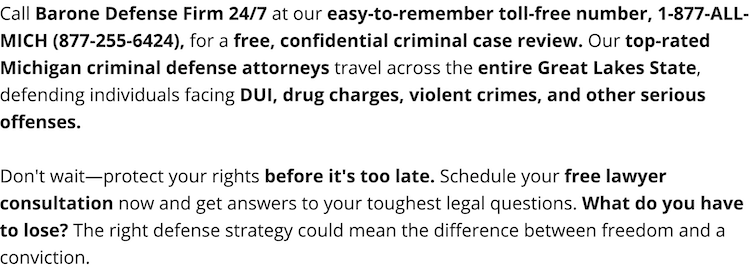Kickbacks
People in all professions may be accused of accepting kickbacks. Kickbacks is the practice of receiving a payment in exchange for having given favorable treatment to the person or entity providing the payment. One classic example is a politician awarding a government contract to a company that provides payment to that politician in return.
In legal terms, however, kickbacks often refer to doctors and medical professionals affected by the federal "anti-kickback statute" and similar state statutes. Violations of the anti-kickback statute can be penalized severely under federal or Michigan law. If you are facing kickback charges, you should should seek advice from a Michigan kickbacks lawyer as soon as possible. A qualified bribery lawyer could work with you to build a strong defense.
Federal Anti-Kickback Law
Under the federal anti-kickback law, it is a felony offense to receive something of value in exchange for referring someone to receive services that will be paid for by a federal health care program. In fact, just asking for a kickback, bribe, or rebate is a violation, as is paying or offering to pay one.
Because this prohibition is so broad, the statute lists a number of situations that will not be considered violations. These include discounting the price on certain drugs provided to certain beneficiaries under the Medicare coverage gap discount program. If an individual has questions about what is considered a kickback violation, they should speak with a Michigan kickbacks lawyer.
Penalties for Violation of the Law
A violation of this statute is punishable by a fine of up to $25,000 and as much as five years of imprisonment. In addition, those convicted become ineligible to participate in federal health care programs in the future, and even without a conviction, the Secretary of Health and Human Services has the discretion to exclude providers from participation in federal health care programs if the office determines that fraud occurred.
As a federal criminal statute, the anti-kickback law is set up so that the government is the only entity that can file an action for a violation. However, as Michigan kickbacks lawyers know, there is a false claims law that allows individuals to file a suit on the government's behalf and if they succeed, they are entitled to receive a share of the recovery.
Michigan Anti-Kickback Laws
In addition to federal statutes, Michigan enacted several provisions prohibiting kickback practices. These include the:
- Medicaid False Claim Act of 1977
- Health Care False Claim Act of 1984
- Section 333.16221 of the Michigan Public Health Code
- Section 750.428 of the Michigan Penal Code
- Section 445.162 of the Michigan Compiled Laws
While some of these offenses are misdemeanors, others are felonies with very severe penalties. If an individual is facing any of these charges, they should speak to a Michigan kickbacks lawyer immediately.
Contacting a Michigan Kickbacks Attorney
There is no doubt that the kickback laws both at the federal and state level are taken very seriously by law enforcement officials and that the penalties for breaking them can be grave. Because the statutes are worded in broad language, zealous officials may charge individuals with violating these laws in situations where such charges are not warranted.
Regardless of the situation, anyone charged should consult an experienced Michigan kickbacks lawyer to begin preparing a vigorous defense. If you are facing charges related to kickbacks, call now to learn how
 Barone Defense Firm Home
Barone Defense Firm Home
















